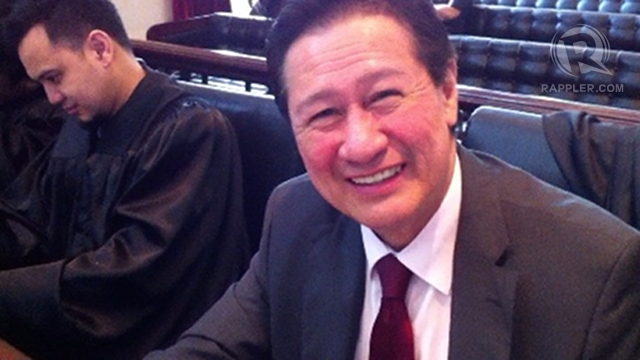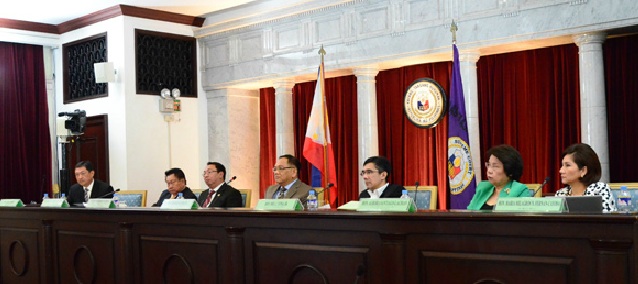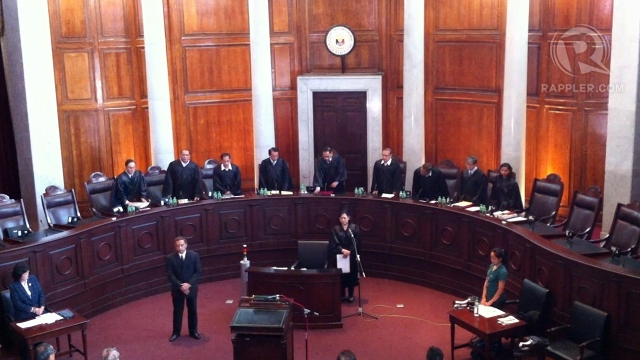SUMMARY
This is AI generated summarization, which may have errors. For context, always refer to the full article.

MANILA, Philippines – Are lawmakers acting like spoiled children?
Former Solicitor General Frank Chavez chided Congress for saying it might boycott the search process for the next Chief Justice.
During Supreme Court oral arguments on Thursday, August 2, Chavez responded to the statement of Sen Joker Arroyo that the Senate and the House might withdraw from the Judicial and Bar Council (JBC) if only one representative of Congress will be allowed in the body.
Arroyo defended the Senate’s position that the chamber and the House should have one representative each in the JBC. The senator argued along with Assistant Solicitor General Roman del Rosario because Solicitor General Francis Jardeleza is a nominee. Chavez is the petitioner in the case.
“The alternative is there is gridlock,” Arroyo told the court. “Just supposing the Senate and the House decide to withdraw their membership from the JBC, it’s a blight on our system ….We cannot compel the Senate and the House to send representatives.”
Chavez rejected the scenario.
“That is a childish threat. Growing old is inevitable but sometimes, growing up is an option …. The JBC cannot be held hostage by the recalcitrance of both the Senate and the House of Representatives.”
Arroyo later on clarified that Congress made no threat to boycott the JBC. Yet last week, Congress suddenly decided to pull out of the search process pending the resolution of the issue.
The Supreme Court held oral arguments on Chavez’s petition after Congress appealed its July 17 decision that the legislature must have only one representative in the JBC.
The oral arguments pushed back the JBC’s timetable to come up with a shortlist of candidates for chief justice. The Council was supposed to meet today but moved the deliberations to Monday, August 6.
Time is ticking not just for the JBC but also for President Benigno Aquino III, who has only until August 27 to name the replacement of dismissed Chief Justice Renato Corona.
Oversight in Constitution?
The oral arguments revolved around Section 8 (1), Article VIII of the 1987 Constitution, which states that the JBC must be “composed of the Chief Justice as ex-officio Chairman, the Secretary of Justice, and a representative of the Congress as ex-officio members, a representative of the Integrated Bar, a professor of law, a retired member of the Supreme Court, and a representative of the private sector.”
Arroyo argued that the constitutional framers made an oversight because they drafted the provision with a unicameral legislature in mind. Later on, however, they decided to adopt a bicameral Congress.
“We are a victim. We are now being punished by the oversight of the Constitutional Commission,” said Arroyo.
Arroyo called on the court to correct the supposed error by exercising what he called “judicial activism.”
“It is an impossible situation because the Senate cannot represent the House, nor can the House represent the Senate. The framers of the Constitution provide that the two, while under one roof, are not Siamese twins.”
Justice Jose Perez asked Arroyo and Del Rosario whether the Supreme Court has the power to effectively correct the alleged mistake in the Constitution.
Arroyo and Del Rosario said the Supreme Court must rule in favor of the spirit, and not the letter of the law.

‘No half-men in JBC’
Chavez, though, said no correction is necessary.
“This is as simple as ABC …. ‘A representative’ means one, single. It’s as simple as that. We don’t need to go into the Constitutional Commission. Congress says the word ‘a’ means two, that to me is the most absurd interpretation. Why even interpret when the provision of the Constitution is very clear?”
Chavez added, “Judicial activism? What is called for here is judicial restraint. If you require the court to come up with a new version of the 1987 Constitution, an adjunct Constitutional Commission, you are not engaging in judicial activism. You are engaging in judicial legislation or amending the Constitution and that cannot be done.”
The former solicitor general said the solution is for Congress to go back to the 1987-1994 set-up where the Senate and the House alternated in sitting on the JBC.
Chavez also shot down proposals for the representatives of the Senate and the House to each have a half-vote, as initially suggested by the late Sen Renato Cayetano.
“It’s as if to make a senator a half-man or a congressman a half-man but we all know two half-men do not a man make.”

Status quo for CJ?
To solve the possible gridlock, Justice Martin Villarama asked if Congress will be amenable to lifting the “immediately executory” clause in the Supreme Court ruling. Villarama said that the Supreme Court anyway has 90 days to rule on Congress’ motion for reconsideration.
The proposal will cause a status quo in the JBC, meaning both Senator Francis Escudero and Rep Niel Tupas Jr can still cast one vote each for the next Chief Justice.
Other justices also said Congress might want to wait so that the full court can decide on the matter.
Only 9 justices are participating because 5 nominees for Chief Justice inhibited: Acting Chief Justice Antonio Carpio and Associate Justices Presbitero Velasco Jr, Teresita Leonardo-De Castro, Arturo Brion, and Maria Lourdes Sereno. Justice Roberto Abad did not inhibit.
Arroyo said the proposal will do “no harm.” Chavez again disagreed.
“To do so will prolong the violation of the Constitution. Every day that this issue is not resolved, we bring the Constitution nearer to the trash can because we do not observe it, we do not honor it.”
Quality over quantity?
Under questioning from Justice Abad, Del Rosario said the quality of JBC members is more important than the quantity. He argued that a senator brings a national point of view to the JBC while a congressmen offers a local perspective.
Abad also pointed out that in other provisions, the Constitutional framers were explicit in identifying the number of members in collegial bodies like the Commission on Audit and the Commission on Appointments.
The Chief Justice nominee asked, “Which issue is more paramount in the minds of those who crafted the Constitution: the full manifestation of the various points of view or the restriction in number?”
Del Rosario responded that quality is paramount.
Chavez requested the Supreme Court to decide on the motion for reconsideration before the JBC meets on Monday, August 6, to finalize their shortlist for the President. – Rappler.com
More in #SCWatch:
- De Lima appeals IBP decision on disbarment
- 22 official candidates for Chief Justice
- JBC to interview CJ candidates starting July 24
- 25 accept nominations for chief justice
- Questions for chief justice candidates
- JBC should review process of choosing CJ
- Besides JBC, Palace has judicial search committee
- CONVERSATIONS: How should the JBC choose the next chief justice? #SCWatch
Add a comment
How does this make you feel?
There are no comments yet. Add your comment to start the conversation.